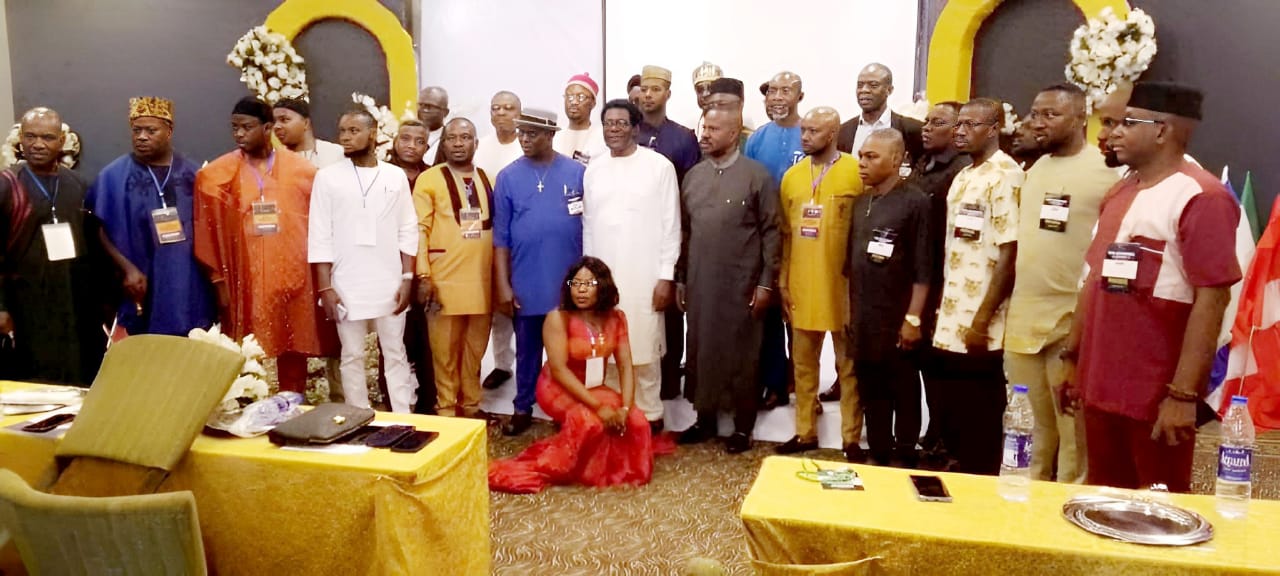
BY Chukwuemeka Okoro, Esq.
This topic is made relevant at this time no doubt, by the recent developments on the political landscape in Imo state in which those at the unfavourable end of the Judicial gravel or stick at the recent Supreme Court’s Judgment in the IMO Guber case have headed back to the same court with a prayer to have it reverse itself.
Given the manifestly immense publicity of the case as a public interest suit, Nigerians majority whose knowledge of the hierarchy and functionality of courts in Nigeria settle at the notion of the Supreme Court being the court of last resort, are perplexed by the return by these losing parties, to the Supreme Court, asking it to revisit its decision in the case in which a FINAL judgment has been entered and executed.
No reasonable person would blame the lay public for failure to understand where the gavel finally rests or to their great relief, when in any one case, they would be spared forever, the hair splitting legalese of lawyers and the judges.
Naturally, many questions arise in this connection. Is the Supreme Court no longer the last court? Is its judgment not final? Does the Supreme Court still have the jurisdiction to hear appeals from itself? Can it do what it is being asked by the Imo elements to do-reverse. Let me just pick only the issue i consider most fundamental and a threshold issue that had arisen therefrom and would certainly dominate the entire proceedings in the reversal application..
The Supreme Court is a creature of the constitution which declares thus:
“There shall be a Supreme Court of Nigeria” Section 230(1) of the Constitution of the Federal Republic of Nigeria, 1999.
Some may ask how the Supreme Court, long since existing before the 1999 Constitution, came to be created thereunder.
The Supreme Court exercises federal judicial powers. States and federal Judicial powers derive directly from the constitution as the source of their conferment on the courts, the agency suited to their exercise
“The Courts to which this section relates, established by the constitution for the federation and the states, specified in subsection (5)(a) to (i) of this section shall be the only superior courts of record in Nigeria and save as otherwise prescribed by the National Assembly or by the House of Assembly of a state, each court shall have all the powers of a superior court of record” Subsection (3) of section of the Constitution.
The answer is that a superior court of record has judicial powers to assume jurisdiction over any subject matter in respect of which it is not expressly statutorily or constitutionally prevented from entertaining. Expressed in another way, there is a presumption of jurisdiction in a superior Court of record over and in respect of any matter except there exists in a law, a valid provision which unequivocally bars it from adjudicating that issue.
This principle has been stated several times by the Supreme Court. In the case of Shodeinde Vs The Registered Trustees of Ahmaddiya Movement in Islam (1980) 12 SC 225., the Supreme Court per Aniagolu JSC said of this principle:
“It is the very recognized law that prima facie, no matter is deemed to be beyond the jurisdiction of a superior court unless it is expressly shown to be so, while nothing is within the jurisdiction of an inferior tribunal, unless on the face of the proceedings, it is expressly shown that the particular matter is within the cognizance, of the court”.
Applying this principle to the extant case, it becomes understandable that the Supreme Court (as a superior court of record) shall have power and jurisdiction to revisit its decision should it be inclined so to do, unless a provision can be found in the constitution or other statute stating a contrary position.
The Court also enjoys inherent powers which flow from the constitution.
The Supreme Court, per Ogundare J.S.C. in Chime Vs Ude (2006) 7 SCNJ 81 @ 89 para. 30 held that:
“The general rule is that any court of record has an inherent power to set aside its judgement or order which is a nullity”.See also Mark V Eke.
So, there is always an inherent power to set aside a judgement given in the absence of jurisdiction or where the procedure adopted is such as to deprive the decision of the character of a legitimate adjudication.
Order 8, Rule 16 of the Supreme Court Rules expressly precludes the supreme court from reversing or revising its Judgment only in few circumstances.
Yes, the Supreme Court the Supreme Court cannot revisit its decision in very few exceptional circumstances, which are:
i. To correct clerical mistakes
ii. To correct some errors arising from any accidental slip or omission, and
iii. To vary the judgment or order so as to give effect to its meaning or intention.
I have taken the pain to carefully read through the said Supreme Court Judgment seeking to be reviewed, with the greatest respect to the applicants team, i an unable to see what to be reviewed in the said Judgment.
The error contemplated by this provision is not an error of law. Where there had been an error or omission on matters of law, the court would not have jurisdiction to correct such errors or omissions even when they are apparent on the face of the judgments. In Race Auto Supply Co. Ltd Vs Akibu (2006) 51 1 @ 29 Per Mohammed J.S.C. held that the correction of an error of law would amount to sitting on appeal over its on Judgment.
The Fundamental question then is does the Supreme Court, having delivered its Judgment in the Imo Guba case within the statutory period of 60 days in line with Section 285(7) of the Constitution and become Functus Officio, is still with the Jurisdiction to entertain or delve into the matter again after the said statutory period has lapsed? My candid opinion is NO. The application seeking a review of the said Judgment was pursuant to section 22 of the Supreme Court Act and Section 6(6) of the Constitution. Section 22 of the Supreme Court Act which is in Pari Material with section 16 of the Court of Appeal Act..The section confers on the court a general power to assume original jurisdiction over a subject matter which which the court of first instance had the jurisdiction to entertain, which do not apply to election matters, same being Sui-Generus..See Lakoju v Adeleke. The law is that the time prescribed by the Constitution for doing a time cannot be extended or enlarged. In CHRISTOPHER R. D. OGOH V. DAGOGO ELIHEGG-KACK in Appeal No: CA/PH/EP/74/99 the Court held that
“Where the time prescribed by election petition states certain things to be done within a period of time and these are not done, within the time limit allowed or permitted by the statute, any Court purporting to exercise jurisdiction outside it is on a thankless and Worthless pursuit of its own”.
I concur with his lordships on this because Section 285(5) Constitution provides that ” An election Petition shall be filed within 21 days after the date of the declaration of results of the elections.
Hence, in OGBEBOR v DANJUMA (2003) 15 NWLR (PT. 843) 403 AT 434-435 where a petition filed 2 clear days outside the 21 days period stipulated by law, was dismissed. The Court of Appeal in IMEH v OKON (2012) 11 NWLR (PT. 1311) AT 271 held,
“If petition is filed out of time, the Tribunal lacks the necessary jurisdiction to deal with the petition filed outside the mandatory 21 days, it being statute barred … where a petition is statute barred, the petition may or may not have merit and the Tribunal no longer has jurisdiction to deal with the petition. The Tribunal can only dismiss the petition it being statute barred”
In OYENIYI v KAREEM (2012) 20 WRN 91 AT 101 the Court held:
“It is important to note that compliance with statutory provision as to time within which to file an election petition is a fundamental pre-condition, the breach of which had been held to be incurable. Where the statutory provision has not been complied with, the Court has no jurisdiction to entertain he petition”
My Lord, Onnoghen, JSC(As he then was), at the Supreme Court, restated the position of the law when he held in ANPP v MOHAMMED GONI & ORS (2012) 7 NWLR
(PT. 1298) 147 AT 180,
“… the time fixed by the constitution is like the rock of Gibraltar or Mount Zion which cannot be extended or expanded or elongated or in any way enlarged. That if what is to be done is not done within the time so fixed it lapses as the Court is thereby robbed of the jurisdiction to continue to entertain the matter.
There is no appeal to any other body from the exercise of jurisdiction by The Supreme Court as we have seen under section 235 of the constitution by which is meant that no other body, not even the Supreme Court, has jurisdiction to hear an appeal from decisions of its on court. Judicial powers do not therefore extend to appeals on decisions of the court. We have also seen how Order 8 Rule 16 of the Supreme Court Rules prohibits it to review any judgment once given and delivered but allows amendments only to correct clerical mistakes or errors arising from accidental slips or omissions or to vary its order or Judgments which do not correctly represent its meaning or intention, to do so.
In Abraham Olabanji & Anor Vs Salami Adeoti & 2 ors (1996) 2 SCNJ 242., a chieftaincy dispute was brought and won in the High Court of Kwara State by the Plantiffs. While the appeal lodged by the defendants was pending in the Court of Appeal, the 1st Defendant died. The fact of his death was not made known to the Court of Appeal which delivered its judgment in favour of the defendants.
Plaintiffs appealed to the Supreme Court which reversed the Court of Appeal’s Judgment and entered judgment in favour of the plaintiffs.
Three years later, the only survivor of the original three Defendants applied to the Supreme Court to declare its judgment on the issue null and void on the ground inter alia, that the death of the 1st Defendant at the Court of Appeal stage robbed both the Court of Appeal and the Supreme Court of jurisdiction and their judgments were on that account, null and void.
The Supreme Court dismissed the application holding that though the Court has an inherent jurisdiction to set aside its judgment which is a nullity, no fundamental defect in the proceedings of the appeal before it had been found as was capable of vitiating its judgment on account of the 1st Defendant not being a party to the appeal before it.
In the above case, nothing in the proceedings, not even the death of a party to it, on the facts of the case, can be said to have fundamentally affected the intention of the court. Nor was there a clerical mistake, accidental slip or omission which if corrected, would have carried the intention of the court differently from what the letters of the judgment represented. The invitation to the court to reverse itself was therefore, rightly in my humble view, rejected. Section 285 (7) of the 1999 constitution (as amended) provides; “appeal from a decision of an election tribunal or Court of Appeal in an election matter shall be heard and disposed of within 6o days”..From the records, Uzodimma filed his appeal Nov. 20, 2019 and the Judgment was delivered within the 60 days as provided by Section 285(7) which has lapsed. Thus, the Supreme Court judgment is binding, conclusive and cannot be set aside, revised, reversed, reviewed, altered or any other way or form, be touched by any person, including the Supreme Court itself. The Supreme Court having delivered the said decision within the statutory time, has become funtus officio and is therefore, lacking in jurisdiction to entertain any further application to disturb same.
In OBIOHA v IBERO (1994) 1 NWLR pt. 322 Pg. 322 Pg 503, Belgore JSC (as he then was) had this to say:
“What this court is being asked to do, is to review its judgment, not to correct clerical errors or errors from accidental slip or omission, but to overturn its own judgment already given. The Supreme Court has consistently refused to be dragged into the pitfall which the review application represents. The purpose of this application is clear, it is an appeal cloaked in the guise of a motion. From the wordings of a motion and the grounds for bringing it, it is manifestly clear that the validity of the judgment of the Supreme court given on 14th January, 2020, is being challenged as an appeal..
Once the Supreme Court has entered judgment case, that decision is final and will remain so for ever. The law may in future be amended to affect issues on the same subject, but for the case decided, that is the end of the matter… it is emphatically restated that this motion with a double edged sword of alleged powers under the Constitution S.6 (6)(a) and under the Rules (Order 8 rule 16) should once and for all be nailed in its coffin. The law does not permit the court a double say in the matter. It either allows or dismisses an appeal, not the two on the same issue. The inherent powers under S.6 (6) of the constitution cannot be invoked to reverse a decision already given by this court..The Supreme Court is therefore, humbly urged to dismiss the application and refuse the temptation to be dragged into altering the Nations legal jurisprudence, as the court cannot blow hot and cold at the same time on the same issue..



